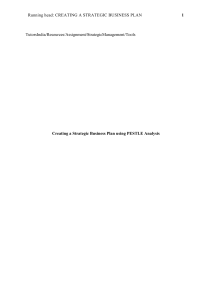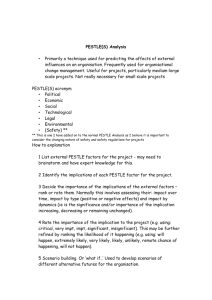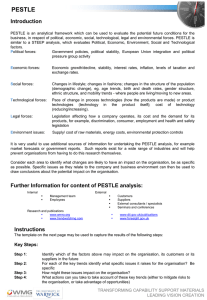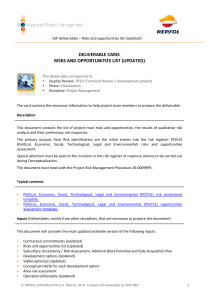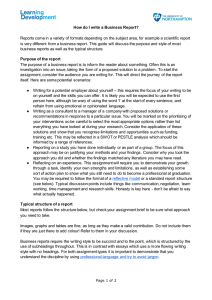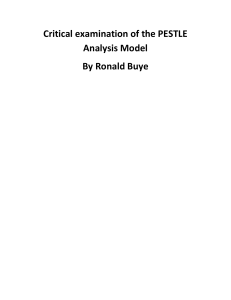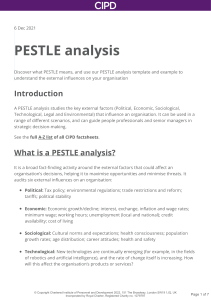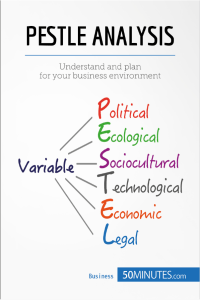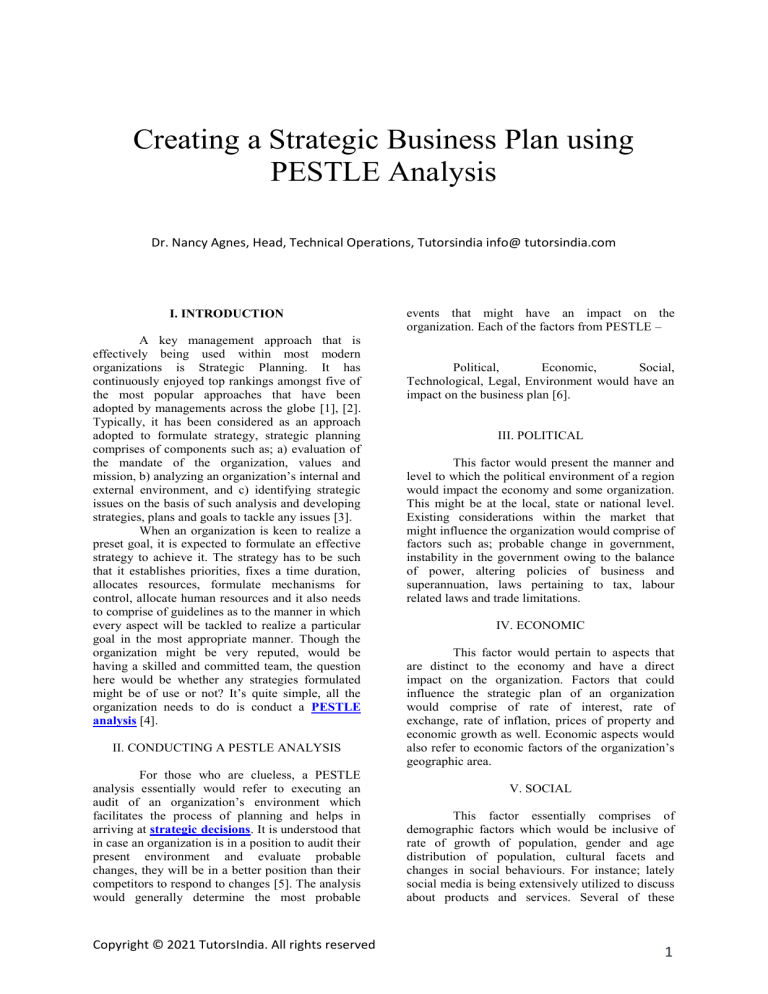
Creating a Strategic Business Plan using PESTLE Analysis Dr. Nancy Agnes, Head, Technical Operations, Tutorsindia info@ tutorsindia.com I. INTRODUCTION A key management approach that is effectively being used within most modern organizations is Strategic Planning. It has continuously enjoyed top rankings amongst five of the most popular approaches that have been adopted by managements across the globe [1], [2]. Typically, it has been considered as an approach adopted to formulate strategy, strategic planning comprises of components such as; a) evaluation of the mandate of the organization, values and mission, b) analyzing an organization’s internal and external environment, and c) identifying strategic issues on the basis of such analysis and developing strategies, plans and goals to tackle any issues [3]. When an organization is keen to realize a preset goal, it is expected to formulate an effective strategy to achieve it. The strategy has to be such that it establishes priorities, fixes a time duration, allocates resources, formulate mechanisms for control, allocate human resources and it also needs to comprise of guidelines as to the manner in which every aspect will be tackled to realize a particular goal in the most appropriate manner. Though the organization might be very reputed, would be having a skilled and committed team, the question here would be whether any strategies formulated might be of use or not? It’s quite simple, all the organization needs to do is conduct a PESTLE analysis [4]. II. CONDUCTING A PESTLE ANALYSIS For those who are clueless, a PESTLE analysis essentially would refer to executing an audit of an organization’s environment which facilitates the process of planning and helps in arriving at strategic decisions. It is understood that in case an organization is in a position to audit their present environment and evaluate probable changes, they will be in a better position than their competitors to respond to changes [5]. The analysis would generally determine the most probable Copyright © 2021 TutorsIndia. All rights reserved events that might have an impact on the organization. Each of the factors from PESTLE – Political, Economic, Social, Technological, Legal, Environment would have an impact on the business plan [6]. III. POLITICAL This factor would present the manner and level to which the political environment of a region would impact the economy and some organization. This might be at the local, state or national level. Existing considerations within the market that might influence the organization would comprise of factors such as; probable change in government, instability in the government owing to the balance of power, altering policies of business and superannuation, laws pertaining to tax, labour related laws and trade limitations. IV. ECONOMIC This factor would pertain to aspects that are distinct to the economy and have a direct impact on the organization. Factors that could influence the strategic plan of an organization would comprise of rate of interest, rate of exchange, rate of inflation, prices of property and economic growth as well. Economic aspects would also refer to economic factors of the organization’s geographic area. V. SOCIAL This factor essentially comprises of demographic factors which would be inclusive of rate of growth of population, gender and age distribution of population, cultural facets and changes in social behaviours. For instance; lately social media is being extensively utilized to discuss about products and services. Several of these 1 aspects might make an impact on the manner in which organizations conduct their businesses with their customers and the techniques used for interacting with them. VI. TECHNOLOGICAL The technological factor would refer to the rapid changes that occur in the domain of technology, technological research and development initiatives and automation. Such factors are instrumental in driving decisions for outsourcing, efficiency and quality considerations. For example; use of smart phones, artificial intelligence, emergence of location based searching, skype meetings or mobile internet for that matter. Over the period of the past three decades, the massive changes that have occurred in the domain of technology has hugely impacted all industry sectors and the speed and level that this will occur only stands to show an upward trend. environment where the organization is located. This would comprise of weather and natural disasters, climate changes, geographical position and sustainability. For instance; if the location where the organization is situated is subject to extreme weather conditions, it would definitely make a negative impact on the organization. X. CONCLUSION All the above said factors are intricately associated with the business and it would do well for an organization to carry out an PESTLE analysis. The analysis will help them to understand their external environment and then they can formulate strategies to tackle them while creating their strategic plan. Tutors India Uk is the #1 Academic Writing Assistance Brand in offering any Business, Management and Marketing research paper or any types of content which offers the core research. REFERENCES VII. LEGAL Legal factors would pertain to every law that is directly linked with the organization and their domain of activity. For instance; laws on privacy, consumer protection laws, employment laws and laws against discrimination could certainly influence some aspects of an organization. [Note: Get the best LLM international law thesis writing online help]. Read blog: Titles for International Public and Private Law in Dissertation VIII. ENVIRONMENTAL The environmental factor draws reference to every factor that is directly linked with, determined or influenced on the basis of the natural Copyright © 2021 TutorsIndia. All rights reserved [1] Darrell Rigby and Barbara Bilodeau, “Management Tools & Trends,” 2018. [Online]. Available: https://www.bain.com/contentassets/f8361c5cd9 9e4f40bbbf83c17d6a91b9/bain_briefmanagement_tools_and_trends.pdf. [2] C. Wolf and S. W. Floyd, “Strategic Planning Research: Toward a Theory-Driven Agenda,” J. Manage., vol. 43, no. 6, pp. 1754–1788, Jul. 2017, doi: 10.1177/0149206313478185. [3] J. M. Bryson, Strategic planning for public and nonprofit organizations: A guide to strengthening and sustaining organizational achievement. John Wiley & Sons, 2018. [4] B. George, R. M. Walker, and J. Monster, “Does Strategic Planning Improve Organizational Performance? A Meta‐Analysis,” Public Adm. Rev., vol. 79, no. 6, pp. 810–819, Nov. 2019, doi: 10.1111/puar.13104. [5] B. George and S. Desmidt, “A state of research on strategic management in the public sector: An analysis of the empirical evidence,” in Strategic management in public organizations: European practices and perspectives, Routledge, 2014, pp. 151–172. [6] B. Gray, “How to Effectively Conduct a PESTLE & SWOT Analysis,” 2016. https://www.linkedin.com/pulse/how-conductpestle-swot-analysis-byron-gray. 2
